Evropski centar za mir i razvoj Univerziteta za mir Ujedinjenih nacija – Regionalni mediteranski institut za međunarodne postdiplomske studije i razvojna istraživanja, Podgorica, u okviru ECPD Međunarodnog programa transfera sistema znanja, u saradnji sa Ministarstvom zdravlja Crne Gore, Ministarstvom zdravstva Federacije Bosne i Hercegovine, Ministarstvom zdravlja i socijalne zaštite Republike Srpske i Zdravstvenom mrežom jugoistočne Evrope (SEEHN), organizuje
II ECPD REGIONALNU KONFERENCIJU
FARMAKOEKONOMSKI ASPEKTI
U ZDRAVSTVENIM SISTEMIMA JUGOISTOČNE EVROPE
(Brioni, 18. – 19. septembar 2015.)
Uvažavajući sve značajniju ulogu farmakoekonomije i farmakoekonomske analize u procesu donošenja odluka, kao i još uvek nedovoljno razvijene resurse u ovoj multidisciplinarnoj oblasti u zdravstvenim sistemima Jugoistočne Evrope, Evropski centar za mir i razvoj Univerziteta za mir Ujedinjenih nacija pokrenuo je inicijativu za održavanje serije regionalnih konferencija, okruglih stolova i sastanaka u zemljama u regionu za donosioce ključnih odluka u cilju unapređenja i jačanja kapaciteta u ovoj oblasti.
Konferencijom će predsedavati prof. dr Klaus-Dirk Henke, Šef Katedre javnih finansija i zdravstvene ekonomije Instituta za ekonomiju i privredno pravo na Tehničkom univerzitetu u Berlinu.
REGISTRACIJA - FARMAKOEKONOMSKI ASPEKTI U ZDRAVSTVENIM SISTEMIMA JUGOISTOČNE EVROPE 2015 (.pdf)
A distinguished professor of the European Center for Peace and Development (ECPD) University for Peace established by the United Nations, Prof. Dr. Nano Ružin delivered a series of lectures to postgraduate students at the prestigious University of Sorbonne in Paris today, 11 December 2015.
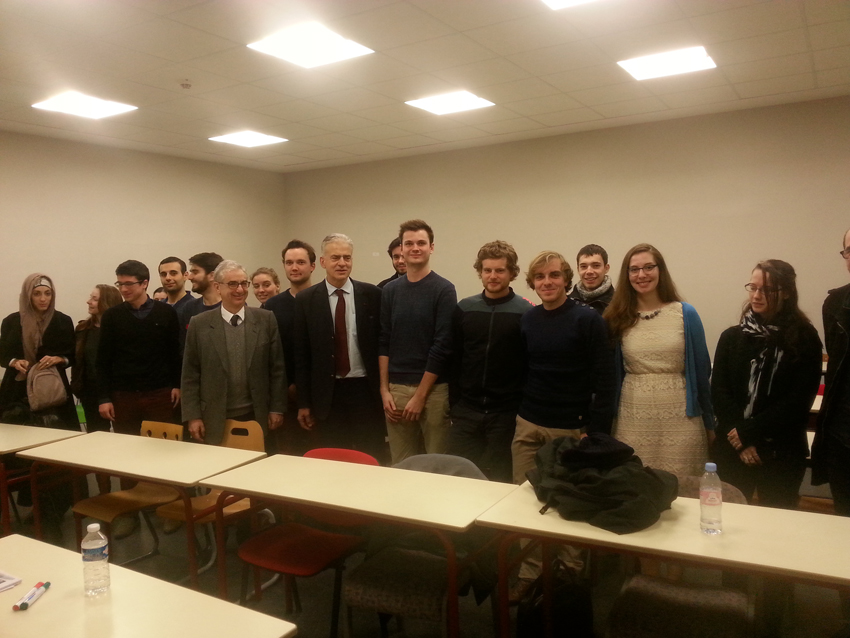
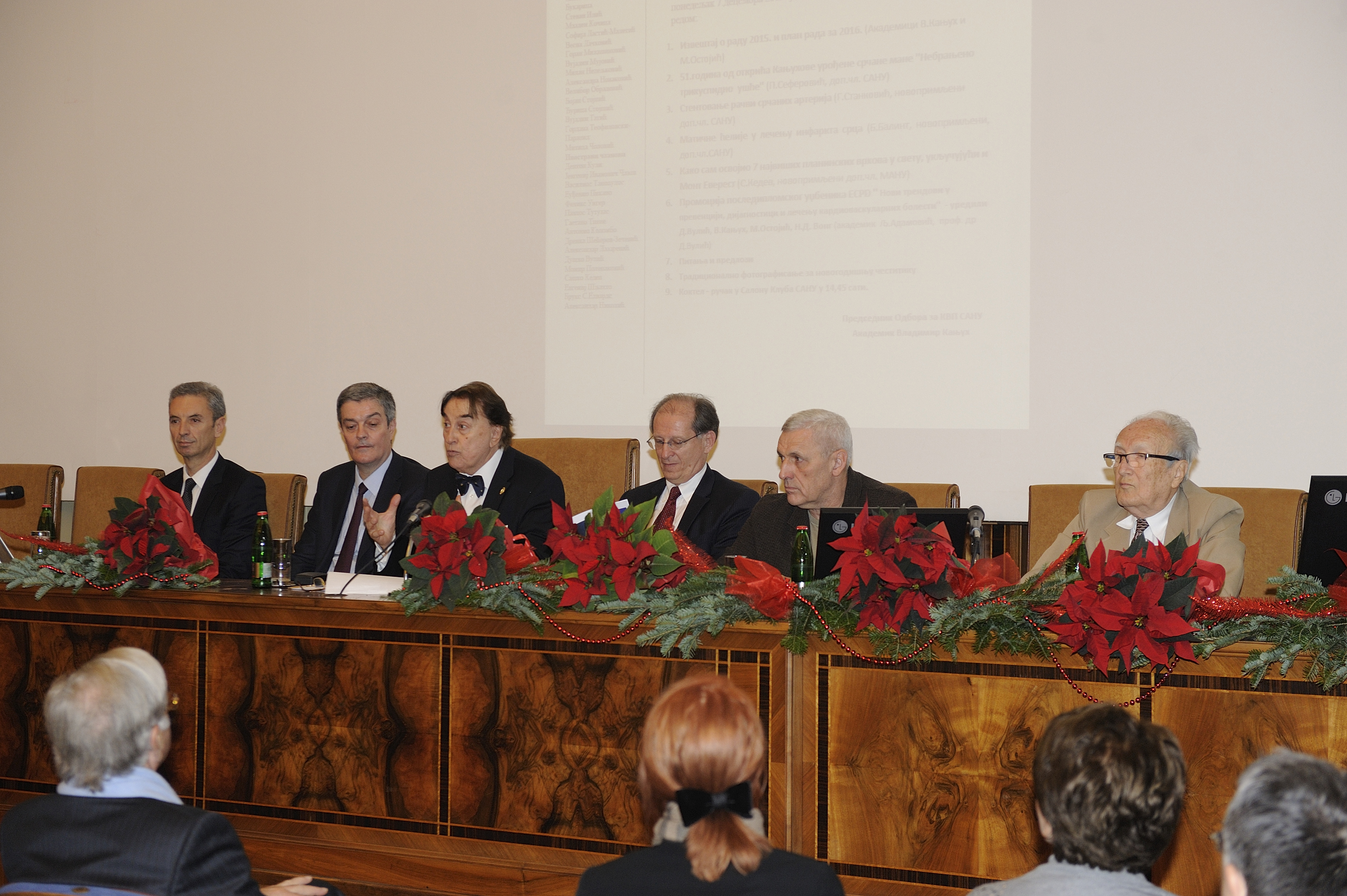
European Center for Peace and Development (ECPD) University for Peace established by the United Nations presented at the regional meeting of the academies of sciences and arts of Balkan countries - departments of medical sciences, held on 10 December 2015, its program on the prevention of cardiovascular diseases, as well as the book recently published by ECPD. At the promotion ceremony Academicians Vladimir Kanjuh, Milan Nedeljković and Ljubiša Adamović spoke about this ECPD program and the book.
The European Center for Peace and Development held the following scientific meetings devoted to management:
· The ECPD International scientific Meeting on Management, was held in Dubrovnik (Croatia), 6-8 October 1988. It was organized in cooperation with the European Institute of Technology, Paris. The meeting was attended by 250 managers and experts of larger business enterprises, banks, export - import firms and research institutions from 27 countries. The world’s latest achievements in the field of management were presented by professors and experts from Belgium, France, Italy, the United States, the OECD and Yugoslavia. The meeting was presided by Prof. Dr Simonida Marjanović, President of the ECPD Council. Other lecturers were: Gerald Compain, Director of Strategies and Services, BULL S.A., Paris; Gilberto Gabrielli, Professor at Business School, Milan, Italy; Dario Velo, Director, School of Business Management, Pavia, Italy; James Howell, Vice-President, Boston Bank, USA; John Marcum, President, European Institute of Technology (EIT), Paris; William Weimer, Vice-President, Educational and Training Programme, IBM Europe, La Hulpe, Belgium, and others;
· The ECPD International Round Table on “Environmental Management”was held in Athens, on 12-15 April 1994. It was attended by 25 experts from Belgium, Denmark, Finland, Greece, Sweden, Great Britain, Macedonia, Italy, Bulgaria and Yugoslavia.
For more details please contact:
ECPD Headquarters
Terazije 41
11000 Belgrade, Serbia
phone: +381 11 3246-041/045
fax: +381 11 3240 673
E-mail: This email address is being protected from spambots. You need JavaScript enabled to view it.
"European Union and the Balkans – Paths to Integration",
Belgrade, January 19 – 21, 2002
The First Consultative Meeting of the Working Group on the "European Union and the Balkans – Paths to Integration" was organized in cooperation with and supported by the Westminster Foundation for Democracy, London. The aim of the Meeting was the development of an educational program and its implementation. On that occasion, 35 participants were brought together: 18 from the Balkan countries, 12 from other European countries and five from international organizations.
The Meeting was organized and held in cooperation with the "European Geological Association". It was devoted to the issues relating to "Orogeny, Magmatism and Metallogeny in Europe". About 600 scientists and experts attended the Meeting from all five continents. It provided a unique opportunity for the scientists from the East and the West, the North and the South, to exchange their experience and achievements in the relevant fields of science. At the meeting more than 300 papers were presented and 73 were published in the ECPD publication "The Fifth Meeting of the European Geological Societies."
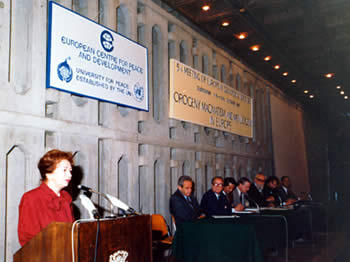
Professor Simonida Marjanovic, President of the ECPD Council, opening the 5th Meeting of European Geological Societies. First from the left in the chair professor Z. Knezevic, first ECPD Executive Director (Dubrovnik, October 6, 1987)
"Defense Industry Conversion in the Southeast European Countries",
Belgrade, 26- 27 April 2002
The Meeting was organized with the aim to explore the ways and means of the ECPD regional research project "Defense Industry Conversion of the Southeast European Countries" realization. It was attended by representatives of the Federal Government of the FR Yugoslavia (ministries of Defense and Foreign Affairs), governments of Bosnia and Herzegovina (both entities), Macedonia, Romania and Montenegro, as well as UNDP (Belgrade Office), Center for Control of Small Arms and Light Weapons in Southeast European and the Yugoslav state Company "Yugoimport SDPR", as co-organizer.
The ECPD was intensively engaged in the field of banking and finance organizing and managing international scientific meetings, and other forms of activities In that respect the World Scientific Banking Meeting as an ECPD affiliated institutions had major role.
The World Scientific Banking Meeting (WSBM) was established as a traditional, periodical, international conference, aimed at gathering the most prominent scientists, financial and banking experts, businessmen, renowned public figures and relevant officials of international, regional and national economic, financial and research organizations from all parts of the world, thus ensuring the exchange of views on the condition, problems and possible solutions in the field of international monetary, banking, financial and trade cooperation in development. The scientific and technical activities of the WSBM were managed by the International Council, encompassingeconomists, bankers and public figures who were interested in international monetary, financial and development problems. The World Scientific Banking Meeting established its Standing Secretariat in Belgrade, which was affiliated to the European Center for Peace and Development in 1989. The first president of the International Council of the World Scientific Banking Meeting was prominent French economist and theoretician in the field of economic development, François Perroux, while the vice - president was well known economists and politician, the founder and first Secretary General of UNCTAD, Raul Plebisch.

Raul Prebisch, Negoslav Ostojić and Bibiano Osorio - Tafall at the II Global Session of the WSBM
In organization of the International Council of the World Scientific Banking Meeting (WSBM) and its Studing Secretariat two meetings were held: the First in Dubrovnik in October 31 – November 5, 1977 and the Second in Dubrovnik in May 26-31, 1980. They were managed by professors François Perroux and Paul Plebish respectively. The meetings were devoted to the international financing of economic development. The WSBM I was attended by 600 participants from 50 countries and 29 international organizations. At the WSBM II 700 participants from 60 countries and 25 international organizations took part.

Julius Nyerere, former president of Tanzania, considered the issues of the less developed countries
The Third World Scientific Banking Meeting, devoted to the future of international financial and trade cooperation, was held in Dubrovnik, on 3 - 6 June, 1989, in the organization of the European Center for Peace and Development and the affiliated Standing Secretariat of the WSBM.

Enrique Iglesias (right), President, Inter - American Development Bank, and Negoslav Ostojić, ECPD Executive Director (III Meeting of the ECPD - WSBM, Dubrovnik, June 1989)
The preparations for this Meeting and its conduct were managed by the WSBM International Council, presided by the well - known scientist and public figure, Saburo Okita (President of the Institute for Domestic and International Policy Studies in Tokyo and former Japanese Minister of Foreign Affairs). The Vice - Presidents of this Council were: Dragoslav Avramović, Director of ECPD Economic Studies; Louis Emmerij, President of the OECD Development Center; Enrique Iglesias, President, Inter - American Development Bank, and Robert Triffin, Professor Emeritus, Yale University. The members of the Council were renowned scientists in the economic development and experts in banking, finance and international trade.

Janez Drnovšek, President of the Presidency of the SFR of Yugoslavia, opening the III WSBM. Sitting in the chair: N. Ostojić, R. Triffin, L.A. Echeveria, S. Okita, D. Avramović, C. Kochlov (Dubrovnik, June 1989)
Special attention at the Meeting was devoted to the debt problems of developing countries. The Meeting, which was presided by SABURO OKITA, was attended by 550 representatives of 50 countries and 22 international organizations – academicians and experts in monetary, financial, banking and commercial affairs. The Meeting was opened by the President of the Presidency of the former Yugoslavia, Mr. Janez Drnovšek. The high level of WSBM III was confirmed, inter alia, by the presence and active participation of four Nobel Prize Winners in economics, former heads of state: Mexico, Tanzania and Nigeria; renowned economic and monetary theoreticians, such as Robert Triffin, Dragoslav Avramović, Robert Solomon, John Williamson and others.

Saburo Okita, President of the ECPD - WSBM International Council
About 130 papers and statements presented at this Meeting provided a basis for a fruitful and creative discussion, as well as the adoption of the appropriate conclusions. More than a half of this material was published in a special publication.

N. Ostojić, ECPD Executive Director (left) and Robert Griffin, Vice President of the WSBM International Council
The conclusions of the Third Scientific Banking Meeting were considered at the special session of the UN General Assembly in 1990 which was devoted to consideration of the special economic issues.
In adopting the research project entitled “Brain and Consciousness”, the European Center for Peace and Development proceeded from the fact that consciousness is one of the oldest scientific problems, which has captured man's attention since the time of antiquity, in the Eastern and Western civilizations alike. In contrast to scientific problems relating to the structure of matter and physical interaction, the phenomenon of consciousness has not been scientifically explained up to the present. The last decade of the 20th century was designated by the United Nations as the brain research decade, which certainly provided a new impetus to the study of the phenomenon of consciousness, as the most complex brain function. In pursuing that point of view the European Center for Peace and Development organized the following ECPD international meetings devoted to the research into such possibilities:
In 1995 and 1996, in Belgrade, two ECPD international scientific meetings entitled “Consciousness - Scientific Challenge for the 21st Century” were held:
· Symposium, May 29 - 30, 1995 and;
· Seminar, September 27 - 28, 1996.
These scientific meetings posed a great challenge to researchers in the field of neurophysiology, psychology, philosophy, biology, modern medicine and the like, and confirmed that research in these fields would be almost unlimited and that it should be continued and expanded on an international plane; The ECPD International Symposium and Workshop “On the Scientific Basis of Consciousness”, Belgrade, 22 - 26 June, 1990, represented the continuation of the ECPD scientific meetings on “Brain and Consciousness”. According to the adopted programme, this five - day meeting consisted of two parts: during the first two days, at plenary sessions, prominent and internationally recognized scientists and experts presented their papers.
On average, these ECPD international scientific meetings were attended by 50 prominent scientists and experts in this field, who also took part in their works, while the ECPD International Symposium, which was held in June 1998, was attended by 75 participants from the United Kingdom, the United States, Australia, Germany, Italy, Russia, Greece, Romania, Bulgaria, Macedonia, France, Belgium, Jordan and the Federal Republic of Yugoslavia.
Within its project “Brain and Consciousness”, the ECPD organized the International Round Table on the “Consciousness – Religion – Society”. The Round Table was held in Belgrade, on April 22, 1997. It was also attended by various renowned scientists, including church representatives.
In the papers presented at this gathering and, especially, in the discussions, the answers to the following questions were sought: can civilization develop new models of behaviour based on the ancient ethical standards through a synthesis of new and old knowledge? Will this synthesis produce a new humanism at the beginning of the new millennium, or remain Eliade’s Utopia? Can we enter the new millennium without interpersonal and ethnic conflicts, or is man still wolf to man? Can history be a genuine mistress of life, or should each generation learn by its own painful experience? The Round Table provided an opportunity for the rationalization of these alternatives, making at least a small contribution
to a wiser tomorrow. The proceedings of all these scientific meetings were published in English.
General review
The European Center for Peace and Development (ECPD), an important international educational and research institution, whose mandate of activities is so-called Helsinki Europe, in the early 1990s shifted its attention primarily to the perceived needs of the countries in transition, especially to the countries of South-Eastern Europe, that is, the Balkan countries. The main objective of this strategic orientation was the promotion of peace and stability in the region by organizing and conducting related educational and international meetings. To that end, the ECPD promoties its international research and education project "National/Inter-ethnic Reconciliation and Inter-confessional Tolerance in the Balkans", which is articulated by two international forums: the ECPD International Conference and the ECPD International Permanent Study Group (IPSG), both pursuing the same goal: national/ethnic reconciliation, inter-confessional tolerance and the human security concept implementation as a prerequisite for peace, stability, economic and social development.
The realization of this Project started in 2005 and in the meantime five conferences and eight IPSG sessions were held. The first conferences were held in Belgrade (Serbia), the fourth in Miločer (Montenegro) and the fifth in the Brioni (Croatia), each at the end of October. The First IPSG Session was held in Sveti Stefan (Montenegro), the Third in Prizren (Kosovo and Metohia) and the Fifth in Belgrade, each of them in-mid June, while another five were held just a day before the relevant Conference.
For more details please contact:
ECPD Headquarters
Terazije 41
11000 Belgrade, Serbia
phone: +381 11 3246-041/045
fax: +381 11 3240 673
E-mail: This email address is being protected from spambots. You need JavaScript enabled to view it.;
The ECPD organized and held the following international scientific meetings on Human Development:
ECPD International Scientific Meetings on the ”Brain and Consciousness”
In adopting the research project entitled “Brain and Consciousness”, the European Center for Peace and Development proceeded from the fact that consciousness is one of the oldest scientific problems, which has captured man's attention since the time of antiquity, in the eastern and western civilizations alike. In contrast to scientific problems relating to the structure of matter and physical interaction, the phenomenon of consciousness has not been scientifically explained up to the present. The last decade of the 20th century was designated by the United Nations as the brain research decade, which certainly provided a new impetus to the study of the phenomenon of consciousness, as the most complex brain function. In pursuing that point of view the European Center for Peace and Development organized the following ECPD international meetings devoted to the research into such possibilities:
In 1995 and 1998, in Belgrade, three ECPD international scientific meetings entitled “Consciousness - Scientific Challenge for the 21st Century” were held:
- Symposium, 29 - 30 May, 1995 for 46 participants,
- Seminar, 27 - 28 September, 1996 for 50 participants, and
- Symposium, June 1998 for 75 participants.
These scientific meetings posed a great challenge to researchers in the field of neurophysiology, psychology, philosophy, biology, modern medicine and the like, and confirmed that research in these fields would be almost unlimited and that it should be continued and expanded on an international plane;
The ECPD International Symposium and Workshop “On the Scientific Basis of Consciousness”, Belgrade, 22 - 26 June, 1990. It represented the continuation of the ECPD scientific meetings on “Brain and Consciousness”. According to the adopted programme, this five-day meeting consisted of two parts: during the first two days, at plenary sessions, prominent and internationally recognized scientists and experts presented their papers.
On the average, these ECPD international scientific meetings were attended by 50 prominent scientists and experts in this field, who also took part in their work, while the ECPD International Symposium, which was held in June 1998, was attended by 75 participants from the United Kingdom, United States, Australia, Germany, Italy, Russia, Greece, Romania, Bulgaria, Macedonia, France, Belgium, Jordan and the Federal Republic of Yugoslavia.
Under its project “Brain and Consciousness”, the ECPD organized the International Round Table on the “Consciousness – Religion – Society”. The Round Table was held in Belgrade, on 22 April, 1997. It was also attended by various renowned scientists, including church representatives.
In the papers presented at this gathering and, especially, in the discussions, the answers to the following questions were sought: can civilization develop new models of behaviour based on the ancient ethical standards through a synthesis of new and old knowledge? Will this synthesis produce a new humanism at the beginning of the new millennium, or remain Eliade’s Utopia? Can we enter the new millennium without interpersonal and ethnic conflicts, or is man still wolf to man? Can history be a genuine mistress of life, or should each generation learn by its own painful experience? The Round Table provided an opportunity for the rationalization of these alternatives, making at least a small contribution to a wiser tomorrow. The proceedings of all these scientific meetings were published in English.
ECPD International Symposium on the Internal Rehabilitation of Disabled Veterans and War Victims
The European Center for Peace and Development held the International Symposium on Medical Rehabilitation of Disabled Veterans and Victims of the War of 1990 - 1992 in Belgrade, 3 - 4 December, 1992. This Symposium was in conformity with the Emergency Plan for the Rehabilitation of War Victims in the Federal Republic of Yugoslavia (Serbia and Montenegro) and Bosnia and Herzegovina, which was prepared by the World Health Organization (WHO) within its humanitarian aid. The Symposium was organized in cooperation with the Ministry of Labour, Health and Social Welfare of the Federal Republic of Yugoslavia, the Ministries of Health of the Republic of Serbia and the Republic of Montenegro and the Ministry of Labour, Veterans' and Social Affairs of Bosnia and Herzegovina. The Symposium was attended by 265 experts from health and other relevant institutions and bodies, and 23 reports presented on this occasion were published in the Proceedings entitled “Medical Rehabilitation of the Disabled Veterans of the War of 1990 - 1992”, Belgrade, 188 pages. The abstracts of these papers, with the conclusions and an appeal for peace in English were submitted to the World Health Organization (WHO) and other organizations within the United Nations system, as well as to international humanitarian and health organizations.
ECPD Specialist Workshop on "Mixed Marriages as a Bridge to Inter-culturality in South - East Europe"
The Workshop was held in Belgrade, 1 - 2 March, 2002 It was organized and held as part of the ECPD Research and Educational Project "The Balkans in the 21st Century - The Ways Leading to the Improvement of Peace, Development and Stability", in cooperation with, and financially supported by the Federal Academy of Public Administration, Vienna, Austria. The main objectives of the Workshop were: a) to bring together the main potential participants in project realization and give them the opportunity to establish interpersonal and professional relations at the conference; b) to portray the regional and local (national) situation concerning the degree of frequency of mixed marriages in each particular country, and c) to provoke critical discussion on the structure and dynamics of the project development.
The Workshop was attended by 25 participants from Bosnia & Herzegovina, Bulgaria, Greece, Macedonia, Romania, Slovenia and the FR of Yugoslavia, representatives of VAB International, Vienna, Austria, and representatives of the University of Belgrade and ECPD. The Project Director and the organizer of this meeting was Dr. Vesna Vučinić-Nešković, a highly professional and enthusiastic anthropologist from the University of Belgrade.
ECPD Regional Conference on "Health Development - Improving the Performance of Health Systems in the South-East European Countries"
The Conference was organized and held in Belgrade, 25 - 26 January, 2002 as part of the ECPD Regional Research and Educational Project "The Balkans in the 21st Century – The Ways Leading to Peace, Development and Stability", in cooperation with, and financially supported by the Federal Academy of Public Administration, Vienna, Austria.
The main objective of the Conference was to contribute to the improvement of health, health development and the performance of health systems in South-East European countries. It was attended by 25 expert representatives of five South-East European countries: Albania, Bosnia & Herzegovina, Greece, FR of Yugoslavia and Macedonia.
Apart form the participants who were asked to present their papers, the Conference was attended by 13 observers, including six from the United Kingdom.
The Director of the Conference was Prof. Dr Predrag Mićović, an eminent professor and well-known expert on health systems development
ECPD Regional Conference on Health Development and Health System Improvement
Assessed by the participants, high-level professionals, as to its content and dynamics, it can be stated that the two-day Conference was very successful.
For more details please contact:
ECPD Headquarters
Terazije 41
11000 Belgrade, Serbia
phone: +381 11 3246-041/045
fax: +381 11 3240 673
E-mail: This email address is being protected from spambots. You need JavaScript enabled to view it.;
The European Center for Peace and Development organized and held a dozen of international meetings on economic development. Some of them were attended by several hundred participants - high-ranking officials, well-known economists and specialists in financing and SME development.
The Ninth Congress of the International Association of the Francophone Economists
In 1-4 June 1989 the ECPD organized, in cooperation with the Association of Francophone Economists, the Ninth Congress of the International Association of Francophone Economists in Belgrade. The discussion at the Congress was focused on “The Development of the International Economy, Financial Relations and Economic Recovery in the World”. At this Congress, 53 papers were presented and among its participants (about 150 from 15 countries of Europe, Africa, North and South America, as well as from two international organizations) there was a number of world-reputed economists and bankers;
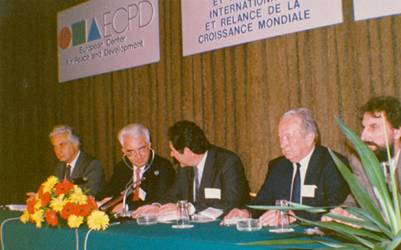
The Chair of the ECPD Conference on Development of the International Economy, Belgrade, June 1989
ECPD International Meeting on Economic Forecasting Methods
In 1989, the ECPD organized, in cooperation with Budapest University, the ECPD International Meeting on the Scientific Methods of Forecasting. Two alternate meetings were held in Belgrade and Budapest and had about 50 participants each from government, scientific and business organizations, mostly from the South East European countries.
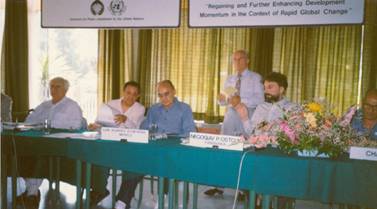
P. M. Henry, L. A. Echeveria, N. Ostojic, D. Avramovic), Sveti Stefan, June 28 - 30, 1990
ECPD International Round Table on “Regaining and Further Enhancing the Development Momentum in the Context of Global Changes”
In 1990 (28 - 30 June), at Sveti Stefan (Montenegro), the ECPD organized the ECPD International Round Table on “Regaining and Further Enhancing the Development Momentum in the Context of Global Changes”. The Round Table, chaired by Prof. Dr Dragoslav Avramović and Prof. Dr Saburo Okita, was attended by 70 representatives of 21 countries and 8 international organizations. The participants in the Round Table discussed new approaches to the debt problem of developing countries from the aspect of international action and economic policies of specified debtor countries. At this Round Table, special attention was devoted to the new international financial situation arising from the events in Eastern Europe.
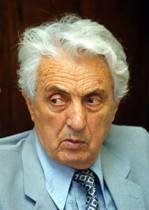
Academician Branislav Šoški, Director of the ECPD Postgraduate Studies and member of the ECPD Academic Council
ECPD International Meeting on “International Economic Trends and Policies, Their Effects on Eastern Europe and the Problems and Prospects of the East European Economies”
In June 1991 (17 - 26 June) the ECPD International Meeting on the above mentioned subject was held at Miločer, Montenegro, and devoted particularly to the reintegration of the East European countries into the world economy and the scientifically based concept of their economic and social reforms. A total of 54 participants from seven countries and nine regional and international organizations addressed a wide range of issues. The Meeting, chaired by Professor D. Avramović, was attended by high officials and experts of the Organization of the United Nations and its agencies, the World Bank, IMF, UNCTAD, EEC, OECD, universities and research institutions from the East and the West;
ECPD International Round Tables on "Privatization in the Economies in Transition”
The First ECPD International Round Table (RT) on “Privatization in the Economies in Transition” was organized and held in Belgrade on 5 -9 December 1995. This RT, chaired by Professors D. Avramović and N. Scott, was attended by 50 participants from the countries in transition, international organizations, academic and banking circles. On this occasion, the ECPD Council set up the Permanent Study Group for Transition and Privatization, consisting of 20 renowned scientists and experts from 10 countries and 5 international organizations. It was anticipated that the group should meet periodically so as to consider the progress made in this area and make recommendations to the governments of transition economies. The papers presented at the Round Table were published in the Proceedings entitled “Privatization in the Economies in Transition”;
On 18-20 October 1997, at Sveti Stefan (Montenegro), the Second ECPD International Expert Round Table was held with the aim which was intended to review the process of “Privatization in the Countries in Transition”. In essence, it was the meeting of the ECPD International Permanent Study Group for Privatization which reviewed the progress made in the process of privatization in the transition countries. At this meeting, 15 papers devoted to the experience of privatization in the Czech Republic, Hungary, Poland, Romania, the Russian Federation, Bulgaria, Macedonia, Croatia and Yugoslavia were presented and then published in the separate proceedings.
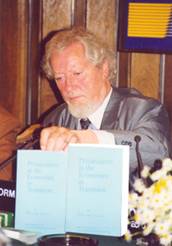
Professor Norman Scott, C.M.G, Chairman of the ECPD International Study Group Ohrid, November 1999
On 26-27 November 1999, Ohrid (FYR Macedonia) was the venue of the Third ECPD International Expert Round Table and the Third Meeting of the ECPD International Permanent Study Group for Transition and Privatization. In this context, the ECPD International Seminar on Positive International Experiences with Privatization, Applicable to the Macedonian Economy was held. The mentioned activities were organized and held by the ECPD in cooperation with the Government of Macedonia. The Round Table and the Third Meeting of the Permanent Study Group were specifically focused on the recent experiences with transition and privatization in the ex-socialist countries and, in this context, on: (1) institutional problems of transition; (2) problems of corporate governance in the process of ownership transformation, and (3) critical factors in this process (capital scarcity, a rise in unemployment, etc.), and how to overcome these problems, proceeding from the experiences of specified countries in transition. The opening of these and the beginning of their work were also attended by the President of FYR Macedonia, Mr. Boris Trajkovski, Macedonian Prime Minister Ljupčo Georgievski and numerous senior officials and experts on various spheres of economic and social life. The President of Macedonian Government presented the strategic guidelines for the privatization process carried out by his Government. Apart from the majority of the members of the Permanent Study Group (of whom there are 20), the participants in these activities were about 50 representatives of the relevant international and regional organizations, including the host-country’s representatives.

B. Trajkovski, President of the Republic of Macedonia, Lj. Georgievski, Prime Minister of Macedonia, N. Scott, Vice-President of the ECPD Council, N. Ostojic, ECPD Executive Director, S. Ichimura, President of the ECPD Academic Council, at the opening session of the Third Meeting of the ECPD International Permanent Study Group on Transition and Privatization (Ohrid, Macedonia, November 1999)
The papers submitted and speeches delivered at all three meetings were published in separate Proceedings.
ECPD International Meeting "Defence Industry Conversion in the South East European Countries"
Within its major programme "The Balkans in the 21st Century - The Ways Leading to the Improvement of Peace, Development and Stability", European Center for Peace and Development launched its Regional Research Project "Defence Industry Conversion in the South East European Countries". In the preparatory phase of the Project, a consultative meeting was organized and held in Belgrade, on 26-27 April 2002. The Meeting was organized and held in cooperation with the Yugoslav State Company "Jugoimport - SDPR". The representatives of UNDP, the Centre for Control of Small Arms and Light Weapons in South East Europe, Governments of Bosnia & Herzegovina (both entities), Macedonia, Romania and the FR of Yugoslavia took parts in the Meeting. They discussed the issues facing defence industries of the countries participating in the Project and modalities of defence industry conversion.
For more details please contact:
ECPD Headquarters
Terazije 41
11000 Belgrade, Serbia
phone: +381 11 3246-041/045
fax: +381 11 3240 673
E-mail: This email address is being protected from spambots. You need JavaScript enabled to view it.;















